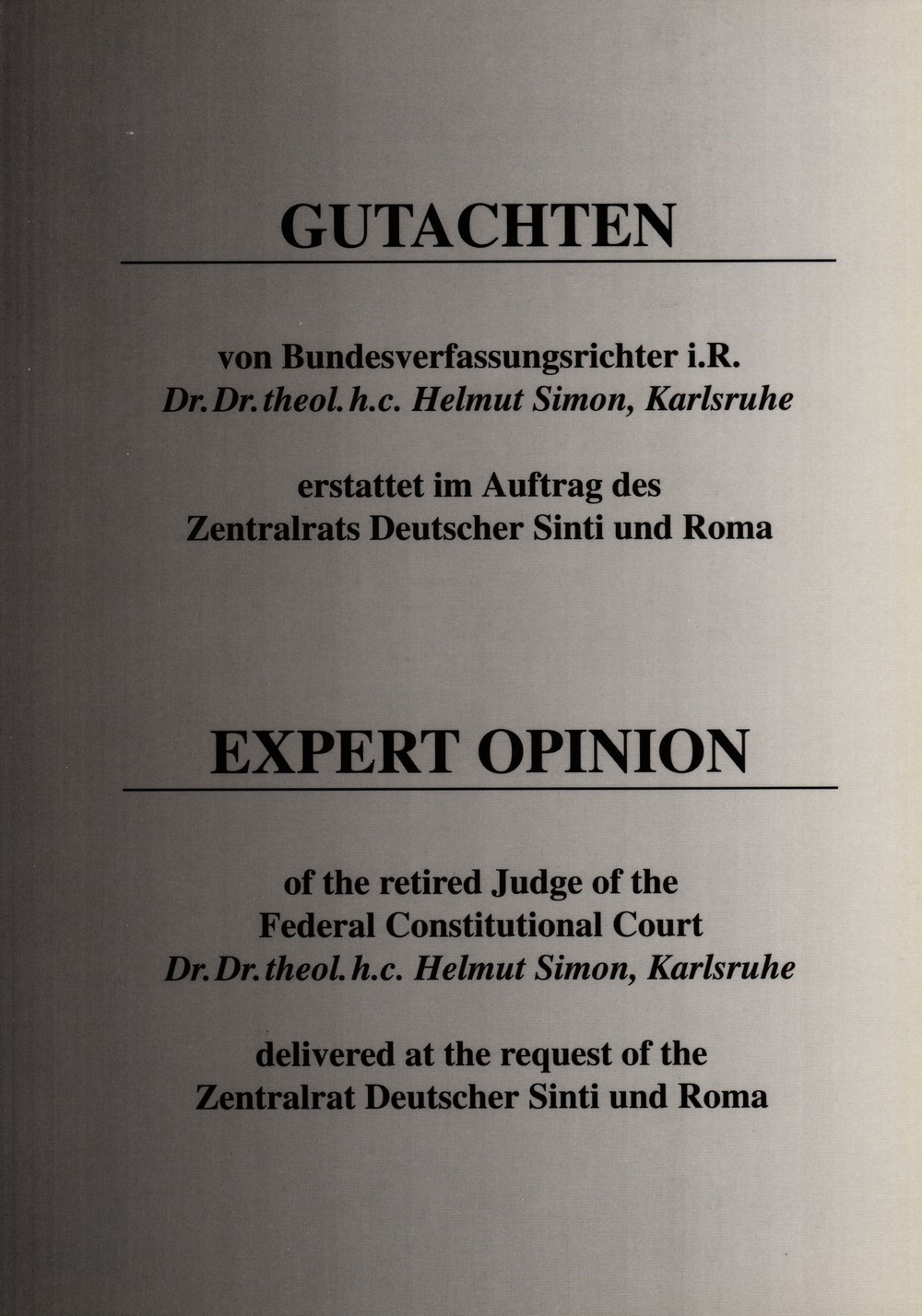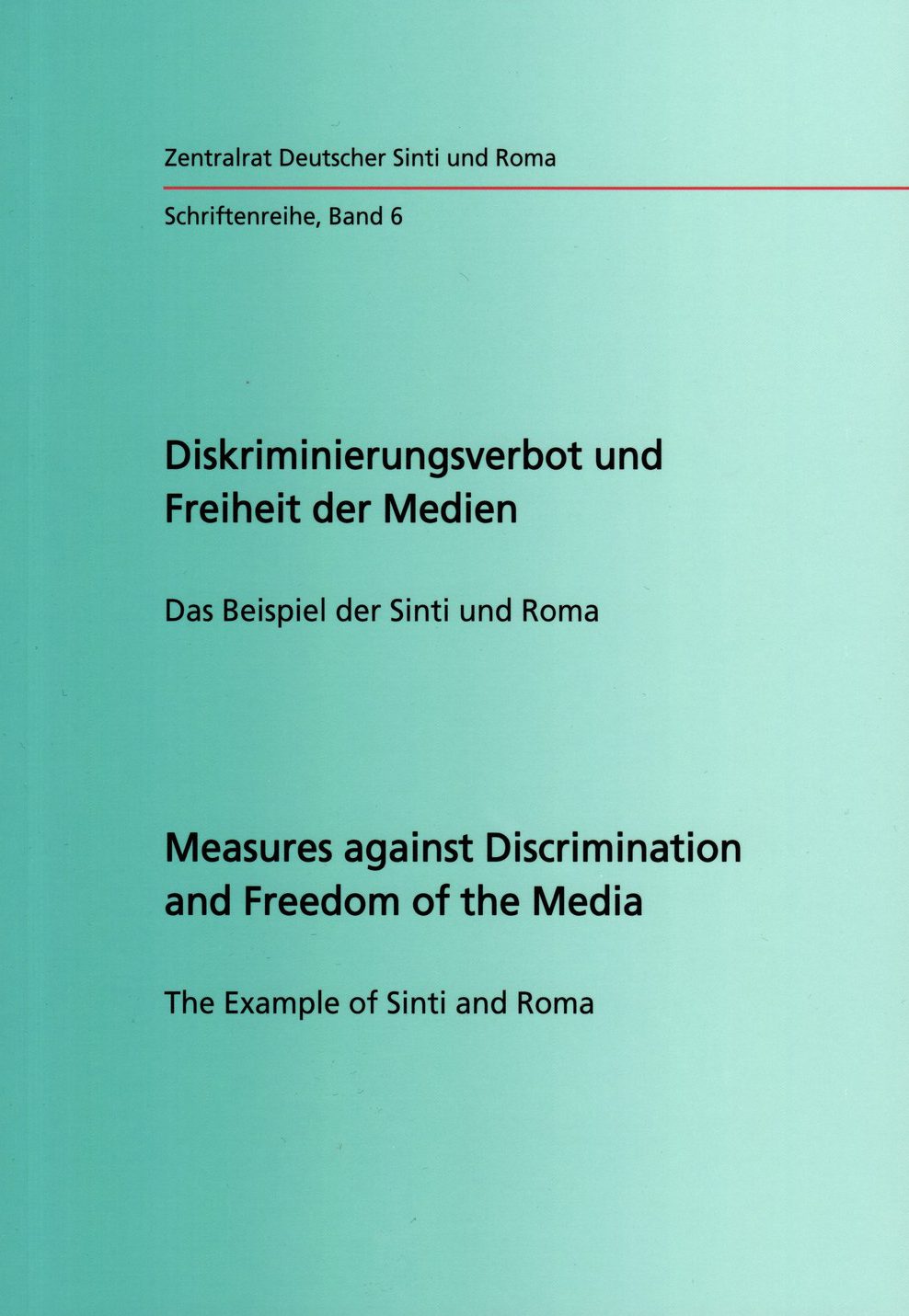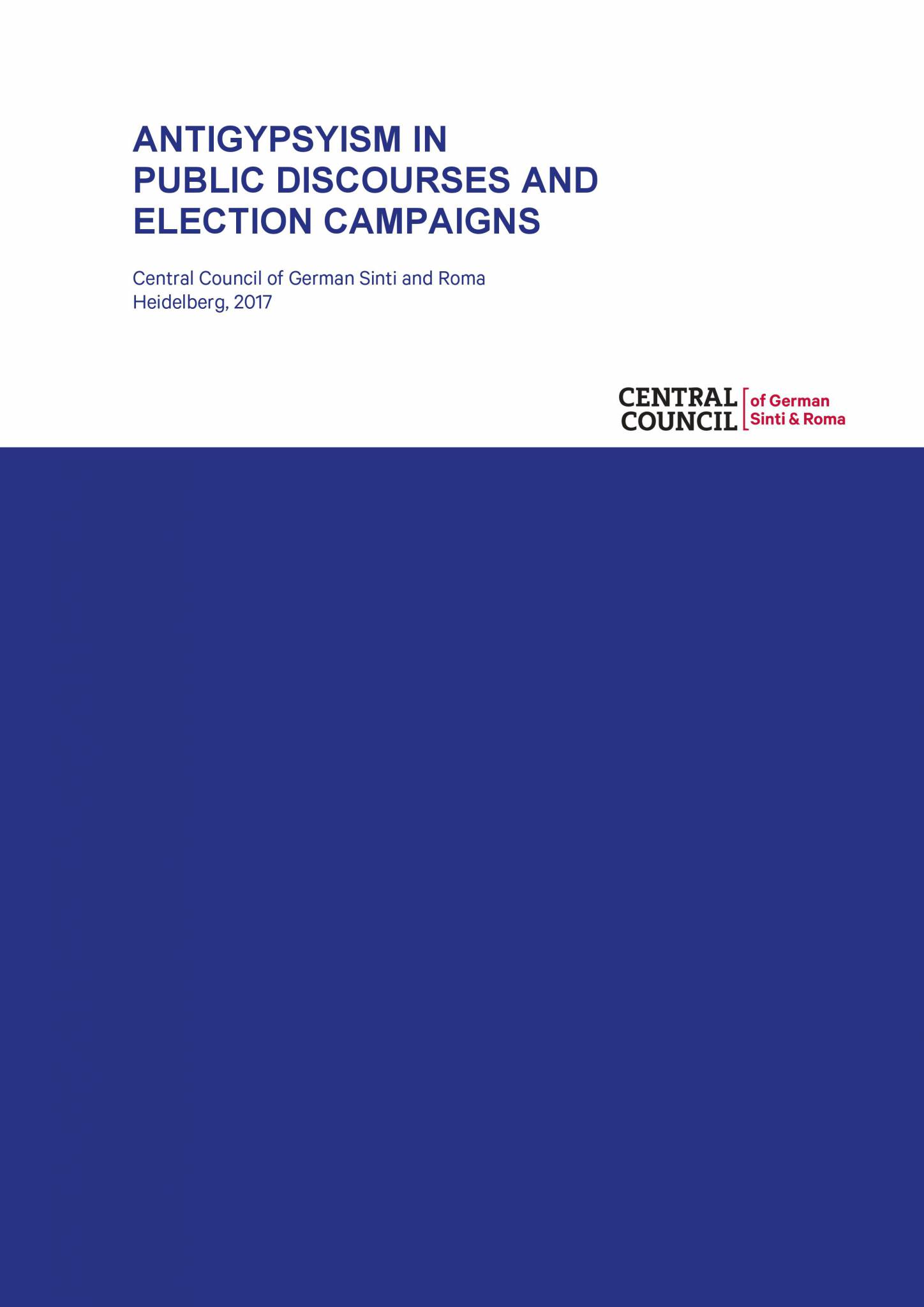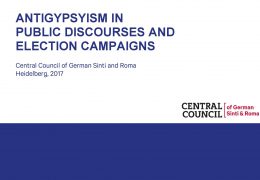National and international legal instruments provide comprehensive protection against discrimination. Despite this, racism and discrimination on the grounds of sex, religion or ideology, disability, age, and sexual identity are not merely a peripheral matter, but an everyday experience of people living in Germany and Europe. Furthermore, discrimination is not just an individual problem – society as a whole is marked by structural discrimination. Discriminatory structures, mechanisms, and rules, as well as acts of discrimination are present in all areas of life, e.g. work, education, and housing. Therefore, anti-discrimination work is essential for drawing the attention of the public and politicians to these shortcomings and in calling for intervention. According to numerous studies – including the latest ‘Mitte-Studie’ of the Leipzig University – Sinti and Roma are particularly affected by discrimination. The Central Council of German Sinti and Roma views this area of work as one of its main priorities and advocates the fullest possible implementation of the protection against discrimination in various areas.
Representative action
Individual action as the only available legal process puts the financial risk squarely on the shoulders of the claimant side experiencing discrimination. In most cases, the claimant suffers from structural disadvantages and/or is even in a dependent relationship with the defendant. The Central Council calls for representative action to be included in the General Act on Equal Treatment (AGG). This will make it possible for anti-discrimination associations, trade unions, work and staff councils, as well as employee representatives to sue on behalf of those affected, which would go beyond the existing policies of the AGG. Currently, this right is reserved for injured individuals, and is available to organisations only as an exception if their rights have been infringed.
Antigypsyism commission of experts
Sinti and Roma are frequently subjected to discrimination and are often victims of crime – from insults and threats to violent attacks and assault. In order for social changes to occur, it is vital to consequently name and politically condemn antigypsyist incidents and phenomena. Even so, unlike anti-Semitism, Antigypsyism has been neither fully recognised as a social problem, nor is it being combated as such. There are neither institutions for Antigypsyism research, nor is there an official report of the Federal Government on this issue. For years now, the Central Council has been calling on the Federal Government to establish an official Antigypsyism expert committee. The purpose of this committee would be twofold: First, it shall be tasked with documenting all forms of Antigypsyism – from common and negative stereotypes to racist propaganda of the extreme right (e.g. election posters of the National Democratic Party of Germany) and Neo-Nazis threatening and inciting violence on the internet. Secondly, the committee is to report its findings to the public and the German Federal Parliament (Bundestag) once per each legislative term. Antigypsyist prejudice is widespread in all areas of society and politics. In order to overcome existing shortcomings in combating Antigypsyism, the expert committee shall make appropriate recommendations based on their findings to the Federal Government and the Bundestag. The committee shall investigate the discrimination against Sinti and Roma in the education, labour market, and housing sectors, and submit a report to the Bundestag once per legislative period. Furthermore, by establishing the expert committee the Bundestag would send an important political message on combating Antigypsyism: That the Federal Republic of Germany recognises Antigypsyism as a social problem and is committed to combating it. This would also demonstrate the particular responsibility that Germany has towards the minority after the Holocaust.
Racist slander on the internet
Due to the anonymity of the internet, the intensity of verbal radicalism has noticeably increased. There has been a steady increase in hate speech on social networks, in web content created by the extreme right-wingers that is full of hatred, threats of violence and death threats against Sinti and Roma, and in online shops selling forbidden hate music and accessories (see www.hass-im-netz.info; please note that the website is only available in German). This publicly spoken slander is then put into action, as evidenced by the increasing number of attacks on accommodation centres for asylum seekers in Germany. For some time now, the Central Council of German Sinti and Roma has been calling on both the Federal Ministry of the Interior and the Federal Ministry of Justice to establish a permanent working group. Other authorities and organisations like Jugendschutz.net (a competence centre for the protection of minors on the internet) and big internet companies (e.g. Google, Yahoo, eBay, Amazon, etc.) would also be involved. At least once a year, the committee would come together with the representatives of the Central Council of German Sinti and Roma, the representatives of the Central Council of Jews in Germany, as well as with representatives of other interested parties to discuss the newest developments and changes. In addition to monitoring the progress made, the working group shall make concrete proposals for combating racist and anti-Semitic incitements to violence on the internet, and for dealing with seditious contents of neo-Nazi webpages.
Police authorities: Reappraising history/education
The Federal Criminal Police Office (German: Bundeskriminalamt, hereafter BKA) set a good example by facing and coming to terms with its history of the founding years of the Federal Republic of Germany and the fact former Nazi perpetrators were directly involved in the BKA in the past. The Central Council of German Sinti and Roma is of the opinion that, following the example of the BKA, police authorities of all German Federal States need to reappraise their respective history as well. Colloquia and scientific studies at the BKA have shown that systematic and massive racism against Sinti and Roma was common practice at the state level – e.g. at the Bavarian Caravan Dweller Office of the Bavarian Criminal Police Office in Munich and among the SS-perpetrators from the Reich Security Main Office (RSHA) employed there. Reappraising the past is not only useful for improving how knowledge is communicated to young police officers, but also suitable for counteracting discrimination and stereotypes. This will make the officials more aware of the importance of democracy and the rule of law, and encourage officers to make an unprejudiced assessment of the situation when encountering persons belonging to minorities. Thus, following the example set by the BKA, the federal police academies should work together with the Documentation and Cultural Centre of the German Sinti and Roma in order to plan and implement information and teaching units for trainees of all service levels in their last year of training.
German police and security authorities
“Due to the experience of our shared history, professional police work today is characterised by a systematic focus on behaviour and action. Regardless of who the person is, regardless of their sex, religion, worldview, or ethnicity, the focus of police work may be only on evaluating individual behaviour and action on the basis of criminal law. Population groups must not be put under general suspicion on the grounds of their sex, religion, or ethnicity. Those who question the individuality and autonomy of others, deny them their humanity.” Jörg Ziercke, former President of the Federal Criminal Police Office
In December of 2007, the Conference of Ministers of the Interior considered closely the regulations for the protection of national minorities against the police using discriminatory terminology towards minorities; and many federal states formulated their guidelines in accordance with the recommendations of the appointed project group. Nevertheless, police stations continue to refer openly and covertly to the ethnic background of Sinti and Roma suspects in press releases and all-points bulletins. Racist images of Sinti and Roma are still widespread and socially acceptable. Minority labelling and ethnic profiling of “Sinti and Roma” only serves to fuel public prejudice against the Sinti and Roma minority. No matter how reprehensible crime, it has nothing to do with the ethnic origin of the perpetrators. The same applies to substitute terms – irrespective of their actual or subjective suitability to be used for discriminating, stigmatising, or denigrating a human being, an ethnic group, a nationality, or a minority. Due to existing power and dependency structures, it is particularly grave when authorities, institutions, schools, and the police engage in discrimination. For this reason, the Central Council is pursuing an approach of “getting to the root” of the issue and is working towards a binding decree of the Conference of Ministers of the Interior. According to this decree, explicit or implicit ethnic background information in reports will be acceptable only if it is absolutely necessary for ascertaining facts, or if knowledge of the minority status is relevant to the investigation.

Helmut Simon
Expert Opinion of the retired Judge of the Federal Constitution Court
Series published by the Central Council of German Sinti and Roma, Volume 2, Heidelberg, 1993, German and English.
The publication can be ordered via e-amil: zentralrat@sintiundroma.de or downloaded here.
The judiciary
The continued employment of former Nazi lawyers is also visible in the decisions of the German judiciary. For example, in 1956, the Federal Court of Justice (Bundesgerichtshof, hereafter BGH) issued a precedent-setting judgement concerning the persecution of Sinti and Roma during the Nazi period. All state persecution before 1943 had been caused by the “Gypsies”, a consequence of “their own asocial conduct, criminality, and roving spirit”, and was therefore allegedly legitimate. To quote an important judgement passage: “As experience shows, they are prone to crime, particularly to theft and deception, in many cases they lack the moral drive to respect the property of others, because – like primitive prehistoric men – they are driven by an unrestrained urge to occupy and possess.” This judgement has shaped the entire compensation legislation concerning Sinti and Roma Holocaust survivors for many years. It was also used to waive criminal proceedings against the Holocaust perpetrators.
It is true that the Federal Court of Justice acknowledged the claims for compensation in 1963 by amending judgement. However, it did not distance itself from the racist characterisation of the minority. Almost 60 years later, during her visit to the Central Council and Documentation and Cultural Centre in March 2015, Bettina Limperg, President of the Federal Court of Justice, renounced this discriminatory judgement. She stated that one could only be ashamed of it – it was an unjustifiable judgement that could not be explained away. A joint symposium of the German Federal Ministry of Justice and the Central Council of German Sinti and Roma took place in the foyer of the Federal Court on 17 February 2016.
The media
The media is tasked with providing information to the public and making public opinion known to the decisions makers. Furthermore, by exercising control and criticism, it has an impact on how people form their opinions. Media, the Fourth Estate, plays an important role in our democracy. By collecting and disseminating news and information on matters of general importance, it shapes individual and public opinion – and in doing so, it essentially shapes the way the majority society views our minority. Discriminatory reporting that reignites and reproduces old prejudices by using stigmatising illustrations and making stigmatising off-camera comments is not acceptable in a diverse society. When reporting on Sinti and Roma, media often speak of them in the context of crime, “problematic real estate”, and “social tourism”. This portrayal sets the tone of public and politic debates, and enables age-old stereotypes to become established as “normal” in the public mind. For this reason, the Central Council seeks to engage in conversation with media representatives and to raise their awareness of the issue.

Measures against Discrimination and Freedom of the Media. The Example of Sinti and Roma
Series published by the Central Council of German Sinti and Roma, Volume 6, Heidelberg, 2009, German and English.
The publication can be ordered via e-mail under: zentralrat@sintiundroma.de
Discriminatory election campaigns
Roma and Sinti in Europe are frequently targeted by racism, hate speech, and incitement, in particular during election campaigns. Politicians and political parties not only from far-right but also from mainstream political parties often draw on resentment and prejudice against Roma and Sinti. They do so in order to win votes through populist strategies and the scapegoating of minorities. The steady repetition of racist public discourse during election campaigns maintains a high level of stigmatization, racism, antigypsyism, antisemitism, islamophobia, and hate speech within politics, media, and society. Therefore, the Central Council of German Sinti and Roma urges politicians and institutions to strengthen their political commitment to sanction any form of hate speech, racism and antigypsyism in the public discourse.
In November 2017 the Central Council published case studies from around Europe by various authors to present examples of hate speech, racism, and incitement against Roma and Sinti in public discourses and election campaigns with case studies from Germany, Slovakia, Spain, Hungary, Bulgaria and Czech Republic. The publication intents to encourage debate on the need of political commitment and the use of existing legal and political tools in order to sanction racism, hate speech, and incitement in the European Union Europe and in Member States´ election campaigns.

Antigypsyism in public discourses and election campaigns
Edited and published by the Central Council of German Sinti and Roma with case studies from around Europe by various authors
Series published by the Central Council of German Sinti and Roma, Volume 11, Heidelberg, 2017, English.
The publication can be downloaded
here.
In 2015, the Federal Ministry of Justice and Consumer Protection commissioned an expert report concerning the question: To what extent could the UN International Convention on the Elimination of All Forms of Racial Discrimination (ICERD) be used to tackle racist campaigning? The report was drawn up by Dr. Stefanie Schmahl, Chair for German and Foreign Public Law, Public International Law and European Law at the Julius-Maximilians-University Würzburg. It examines whether, and if so to what extent and with what consequences, the ICERD, the ICCPR, and the ECHR could or even should resort to the general police clause when interpreting and applying the criteria “public safety” and “public order”.






